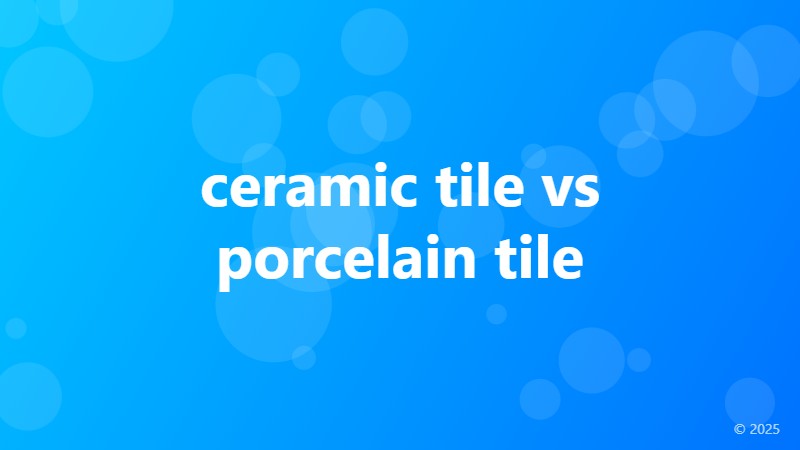ceramic tile vs porcelain tile

Understanding the Difference: Ceramic Tile vs Porcelain Tile
When it comes to choosing the perfect tile for your home or commercial space, two popular options often come to mind: ceramic tile and porcelain tile. While both types of tiles share some similarities, they also have distinct differences that can make one more suitable for your project than the other. In this article, we'll delve into the world of ceramic tile vs porcelain tile, exploring their unique characteristics, benefits, and applications to help you make an informed decision.
Ceramic Tile: A Versatile and Affordable Option
Ceramic tiles are made from a mixture of clay, water, and other minerals, which are then fired in a kiln to create a hard, non-porous surface. This process makes ceramic tiles durable, resistant to scratches and stains, and easy to clean. Ceramic tiles are also known for their versatility, coming in a wide range of colors, shapes, and sizes to suit various design aesthetics.
One of the significant advantages of ceramic tiles is their affordability. Compared to porcelain tiles, ceramic tiles are generally less expensive, making them an attractive option for budget-conscious homeowners and businesses. Additionally, ceramic tiles are relatively easy to install, which can reduce labor costs and make the overall installation process faster.
Porcelain Tile: A Durable and Sophisticated Choice
Porcelain tiles, on the other hand, are made from a specific type of clay called kaolin, which is fired at a higher temperature than ceramic tiles. This process creates a denser, more durable tile that is less prone to water absorption and more resistant to scratches and stains. Porcelain tiles are also known for their natural, earthy appearance, which can add a touch of sophistication to any room.
One of the primary benefits of porcelain tiles is their exceptional durability. They are ideal for high-traffic areas, such as commercial spaces or homes with large families, as they can withstand heavy wear and tear. Porcelain tiles are also more resistant to moisture, making them a great choice for bathrooms, kitchens, and other areas prone to water exposure.
Key Differences: Ceramic Tile vs Porcelain Tile
So, what sets ceramic tile apart from porcelain tile? Here are some key differences to consider:
- Water Absorption: Porcelain tiles have a lower water absorption rate than ceramic tiles, making them more suitable for areas with high moisture levels.
- Durability: Porcelain tiles are generally more durable and resistant to scratches and stains than ceramic tiles.
- Appearance: Ceramic tiles often have a more uniform, glossy appearance, while porcelain tiles have a more natural, earthy look.
- Price: Ceramic tiles are generally less expensive than porcelain tiles.
Choosing the Right Tile for Your Project
Ultimately, the decision between ceramic tile and porcelain tile comes down to your specific needs and preferences. If you're looking for a budget-friendly option that still offers durability and versatility, ceramic tile may be the way to go. However, if you're willing to invest in a more premium product that offers exceptional durability and a sophisticated appearance, porcelain tile is an excellent choice.
By understanding the unique characteristics and benefits of each type of tile, you can make an informed decision that meets your project's specific requirements and budget. Whether you're a homeowner, contractor, or designer, choosing the right tile can make all the difference in creating a beautiful, functional space that will last for years to come.